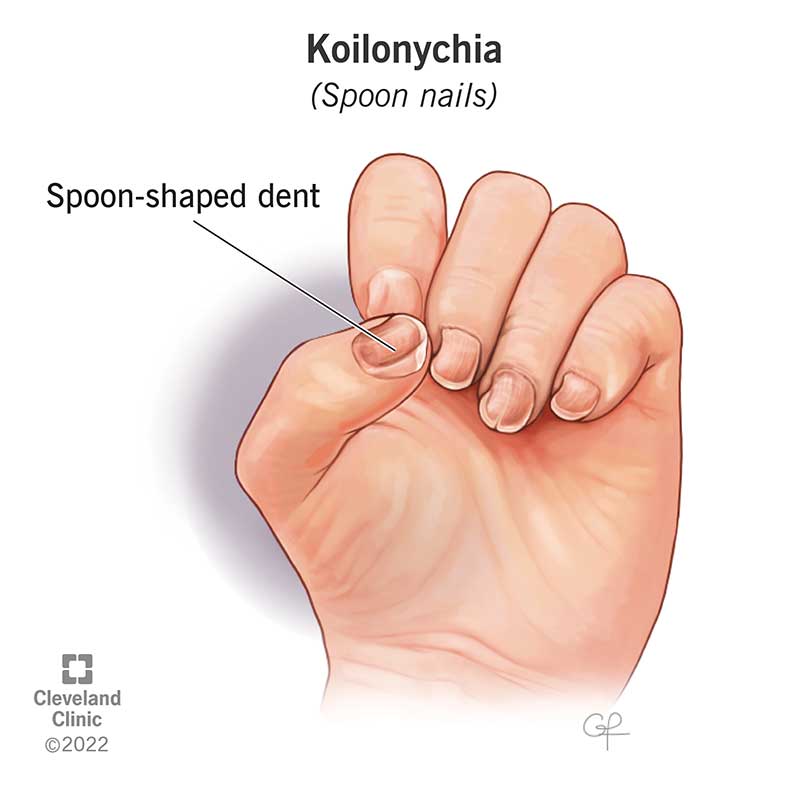Koilonychia is indented nails. Instead of growing straight, your nails look concave, like spoons. In many people, koilonychia is a sign of iron deficiency. Usually, you can get rid of spoon nails by treating the underlying cause.
Advertisement
Cleveland Clinic is a non-profit academic medical center. Advertising on our site helps support our mission. We do not endorse non-Cleveland Clinic products or services. Policy

Image content: This image is available to view online.
View image online (https://my.clevelandclinic.org/-/scassets/images/org/health/articles/22140-koilonychia-spoon-nails)
Koilonychia refers to soft nails that have a spoon-shaped dent in them. Often these “spoon nails” form gradually. In many people, the first sign of koilonychia is flattened nails. Then, eventually, an indentation forms. The indentation is deep enough to hold a drop of water on your nail bed.
Advertisement
Cleveland Clinic is a non-profit academic medical center. Advertising on our site helps support our mission. We do not endorse non-Cleveland Clinic products or services. Policy
Usually, koilonychia occurs because of an underlying medical condition. You’re more likely to have spoon nails if you have nutritional deficiencies like iron or vitamin B deficiencies.
The name “koilonychia” comes from the Greek word koilos, which means hollow. Nychia refers to nail conditions.
No. Koilonychia is a symptom, not an infection. But sometimes people with fungal nail infections can get spoon nails. Usually, if you have a fungal nail infection, you also have inflammation or irritation along with spoon nails.
Most often, spoon nails are a sign of iron deficiency anemia. You may have an iron deficiency because you:
In some cases, koilonychia is hereditary. It can also result from an injury to the nail bed, such as thumb-sucking in babies and toddlers or too-tight shoes in people of all ages.
Sometimes, koilonychia points to another medical condition. Spoon nails can be a symptom of:
Advertisement
No. You may have spoon nails because of an injury or overexposure to petroleum products. For example, hairstylists may use petroleum products routinely for certain hair treatments.
Sometimes, spoon nails are genetic. And people living at very high altitudes appear to have a higher likelihood of spoon nails.
You’re more likely to have koilonychia if you eat a vegetarian diet, which may raise your risk of being low in iron. Other risk factors include having:
Healthcare providers treat the underlying cause of koilonychia. If you have an iron deficiency, changing your diet or taking supplements may correct and prevent spoon nails.
For example, you may eat more iron-rich foods, such as:
You may also need iron supplements. Your healthcare provider can help you determine if you need to take a supplement or make diet changes.
Yes. Often, treating the underlying cause of koilonychia will make your nails grow properly. But it can take a long time. It may take six to 18 months for koilonychia to go away.
There’s no guaranteed way to prevent spoon nails. You can lower your risk of spoon nails by eating a balanced diet. If you have a medical condition that could cause spoon nails, speak with your healthcare provider about management.
You can also lower your risk of nail problems by taking care of your nails. You should:
If you have koilonychia, you should see your healthcare provider. Sometimes, koilonychia is not a cause for concern. But often, it points to a nutrient deficiency or medical condition.
Your healthcare provider can give you tests to determine the underlying cause of spoon nails. Your healthcare provider can also provide treatment options for any underlying conditions.
Yes. Spoon nails in babies are fairly common. One study found that nearly 1 in 3 infants have spoon nails. Usually, babies’ nails flatten as they grow.
Koilonychia is when your nails have an indented shape, like a spoon. Often, spoon nails are a sign of iron deficiency. You’re also more likely to have spoon nails if you have an autoimmune disease, such as lupus, or poor blood flow to your hands or feet. For many people, spoon nails go away if you treat the underlying cause. Your healthcare provider may also recommend dietary changes or supplements to treat spoon nails.
Advertisement

Sign up for our Health Essentials emails for expert guidance on nutrition, fitness, sleep, skin care and more.
Learn more about the Health Library and our editorial process.
Cleveland Clinic’s health articles are based on evidence-backed information and review by medical professionals to ensure accuracy, reliability and up-to-date clinical standards.
Cleveland Clinic’s health articles are based on evidence-backed information and review by medical professionals to ensure accuracy, reliability and up-to-date clinical standards.
Every day, people see your skin, hair and nails. At Cleveland Clinic, our expert and caring dermatology team will make sure they’re healthy and strong.
